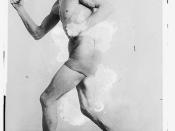Adam Smith is a fountainhead of modern economic thought. Smith is often regarded as the father of economics, and his writings have been enormously influential. The theory that he is most known for is his work based on "the invisible hand." Rational well-being and free-market economy rest on this principle.
In two of his most important published works, Theory of Moral Sentiments and An inquiry into the Nature and Causes of the Wealth of Nations, Smith uses the terminology "invisible hand." In 1776, Adam Smith published The Wealth of Nations, a book that was clearly about economics and that inspired a large number of books, pamphlets, and articles in the next 50 years. Before this book most ideas about economics were scattered in writings that were mostly about politics or ethics or philosophy, not in books that were clearly about economics. The most famous term in the Wealth of Nations is "invisible hand."
Smith used this term only once, in the following quotation:
"...[B]y directing that industry in such a manner as its produce may be of the greatest value, he intends only his own gain, and he is in this, as in many other cases, led by an invisible hand to promote an end which was no part of his intention. Nor is it always the worse for the society that it was not part of it."
Another quotation makes clearer what unintended consequences the invisible hand leads to:
"Every individual is continually exerting himself to find out the most advantageous employment of whatever capital he can command. It is his own advantage, indeed, and not that of the society, which he has in view. But the study of his own advantage naturally, or rather necessarily leads him to prefer that employment which is most advantageous to society."...


